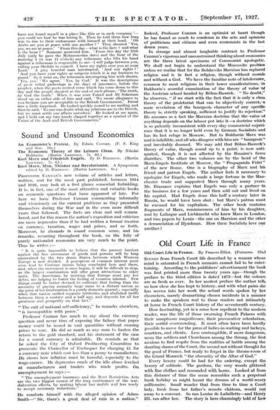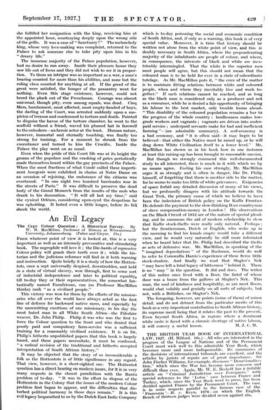Old Court Life in France Old Court Life in France.
By Frances Elliot. (Putnams. • 210 SCENES from French Court life described by a woman whose mind is saturated in French memoirs cannot fall to be enter- taining. According to the publishers' advertisement the book was first printed more than twenty years ago—though the preface to the third edition is dated 1873—but the 'colours are as fresh as ever. In her modest preface the author tells us how close she has kept to history, and with what pal& she has woven into her work the actual words spoken by her characters, merely dramatizing chosen incidents in it manner to make the. speakers real to those readers not intimately at home in-French Court history Of the seventeenth century. How fascinating, yet in is sense how repellent to the modern reader, was the life of those swarming French Palaces with their sumptuous magnificence, their provocative Ostentation, their sordid overcrowding. It must often have been hardly possible to move for the press of ladies-inwaiting and lackeys; courtiers, and clients. Less contemptible, if more dangerous, seem the soldiers and ,Churchmen among the throng, the first anxious to find respite from the realities of battle among the dazzling shams of the Court, the second not without thought for the good of France, but ready to forget in the throne-room of the Grand Monarch "the obscurity of the Altar of God."
Every luxury could be had for the ordering, except the luxury of solitude: The gardens, the very woods glittered with fine clothes and resounded with horns. Looked at from
this distance of time the scene resembles such a perpetual bank holiday as might haunt the dreams of a world-weary
millionaire. Small wonder that from time to time a Court lady, fresh from her father's remote château, woUld run away to a convent. So ran Louise de Lafaillette--and ran after her. 'The Story is here Chariningly told of tio4
she fulfilled her assignation with the king, receiving him at the appointed hour, courtesying deeply upon the wrong side of the grille. It was a case of" Sanctuary !" The melancholy king, whose very love-making was complaint, returned to the Palace to ask someone else to take pity upon him in his "dreary life."
The immense majority of the Palace population, however, had no desire to run away. Inside their pleasure house they saw life out of focus and they did not wish to see it in propor- tion. To them an intrigue was as important as a war, a man's bearing counted for more than his abilities, and none but the ruling class counted for anything at all. If the greed of the great were satisfied, the hunger of the peasantry went - for nothing. Even this stage existence, however, could not breed the pluck out of the Frenchman. Courage was almost universal, though pity, even among equals, was dead. Cinq Mars, handsomest, most affected, most empty-headed of boys, the darling of the Court, was arrested suddenly upon a sus- picion of treason and condemned to torture and death. Painted to disguise the havoc of the torture chamber, he went to the scaffold without a friend, waved his plumed hat in farewell to the onlookers—an heroic actor at the least. Human nature, however, immortal and eternally touching, was finally too strong for training. For a moment he shrank from the executioner and turned to kiss the Crucifix. Inside the Palace the play went on as usual.
Even when the pride of this Court life was at its height the groans of the populace and the crashing of gates periodically made themselves heard within the gay precincts of the Palace. When the most fractious of what Conde called these imperti- nent bourgeois were exhibited in chains at Notre Dame on an occasion of rejoicing, the endurance of the citizens was overtaxed. "In one night two hundred barricades rose in the streets of Paris." It was difficult to preserve the dead body of the Grand Monarch from the insults of the mob who drank to his damnation. "It will all last my time," said the cynical Orleans, considering open-eyed the despotism he was upholding. It lasted even a little longer, before its fall shook the world.















































 Previous page
Previous page